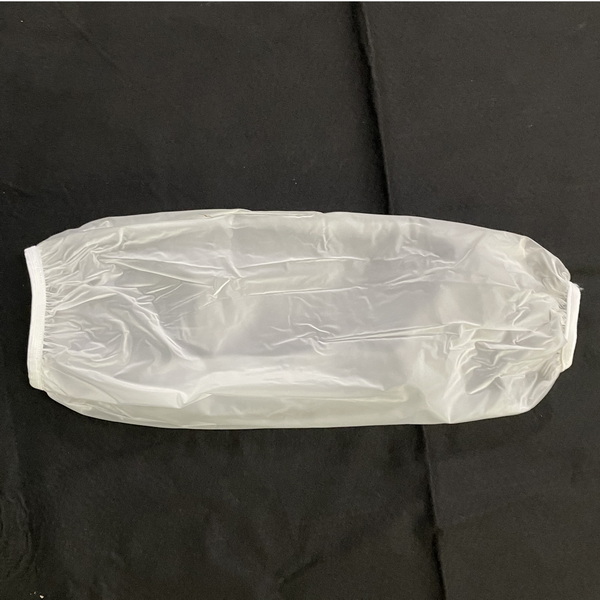සැප්. . 11, 2025 16:57 ලැයිස්තුවට ආපසු
Protect Your Workflow and Hygiene Standards with High-Quality Plastic Arm Sleeves
When cleanliness, safety, and convenience are non-negotiable, businesses and professionals turn to innovative solutions like plastic arm sleeves. These lightweight, disposable barriers have become indispensable across multiple industries, delivering unmatched protection and ease of use while keeping operational costs under control.

How Plastic Arm Sleeves Differ from Traditional Fabric Arm Sleeves in Professional Settings
The first and most significant difference between plastic arm sleeves and traditional fabric sleeves lies in their material properties and intended use. Traditional fabric sleeves, often made from cotton, polyester, or blends, are reusable and designed to provide warmth, mild abrasion resistance, or minor protection against soiling. However, they absorb liquids and contaminants, requiring frequent laundering and increasing operational costs in industries where hygiene is paramount.
In contrast, plastic arm sleeves and plastic arm sleeve protectors are crafted from materials such as polyethylene, polypropylene, or PVC. These materials create an impermeable barrier against moisture, oils, chemicals, and biological contaminants. They are typically used once and discarded, eliminating the risks associated with fabric cross-contamination and making them an excellent choice for food processing, healthcare, laboratory work, and cleaning services.
Furthermore, plastic arm sleeve protectors are lighter and more comfortable, allowing for unrestricted movement during high-paced tasks. Fabric sleeves can retain heat and moisture, making them uncomfortable for extended wear, whereas plastic arm sleeves remain cool and lightweight, ensuring user comfort even during long shifts.
Why the Thickness of Plastic Arm Sleeves Matters for Protection and Comfort
A critical factor influencing the performance of plastic arm sleeves is their thickness. Measured in microns or mils, the thickness determines the sleeve’s durability, tear resistance, and flexibility. Thinner polythene sleeve options, often ranging from 15-20 microns, offer excellent dexterity and are perfect for low-risk tasks where the primary goal is to keep arms clean and dry.
However, for environments involving heavy splashing, abrasive materials, or potential contact with chemicals, thicker plastic arm sleeve protectors—ranging from 30-50 microns—provide superior protection. These sleeves resist punctures and tearing, ensuring workers stay safe and comfortable during demanding tasks.
Businesses must balance protection with comfort. While thicker sleeves offer robustness, they may slightly reduce flexibility and increase heat retention. Premium plastic arm sleeves are engineered to deliver a perfect compromise—offering resilience without sacrificing comfort, ensuring workers can perform tasks efficiently while remaining protected.
Industries and Scenarios Where Plastic Arm Sleeve Protectors Are Essential
The versatility of plastic arm sleeve protectors is evident in their broad range of applications. In food processing facilities, hygiene regulations are stringent. Workers rely on plastic arm sleeves to prevent direct contact with raw ingredients, ensuring both product safety and personal hygiene. Polythene sleeve options are ideal in these environments because they’re lightweight, cost-effective, and disposable after each shift or task.
Healthcare settings—including hospitals, dental clinics, and laboratories—also demand the superior protection offered by plastic arm sleeves. They serve as an essential barrier against bodily fluids, pathogens, and contaminants, reducing the risk of cross-infection during medical procedures or specimen handling.
In cleaning services and janitorial work, plastic arm guards provide effective defense against harsh cleaning agents, dirt, and grime. They protect clothing and skin from exposure to chemicals and water, ensuring worker safety and maintaining a professional appearance.
Manufacturing and industrial environments benefit tremendously from plastic arm sleeve protectors. In paint shops, chemical plants, and electronics assembly lines, workers use these sleeves to shield their arms from oils, solvents, and fine particulate matter. The disposable nature of plastic arm sleeves helps prevent contamination in sensitive processes, such as semiconductor production.
Why Plastic Arm Guards and Polythene Sleeves Are a Cost-Effective Safety Solution
Aside from hygiene and protection, cost-effectiveness is a compelling advantage of using plastic arm guards and polythene sleeve products. Unlike reusable fabric alternatives that incur costs from repeated washing, drying, and maintenance, disposable plastic arm sleeves eliminate laundering expenses and reduce labor time associated with cleaning.
Bulk purchasing of plastic arm sleeve protectors further lowers the unit price, making them a highly economical option for businesses of any size. They’re lightweight, compact, and easy to store, freeing up valuable space in supply rooms and making inventory management simple.
For businesses committed to sustainability, manufacturers now offer eco-friendly plastic arm sleeves made from recyclable or biodegradable materials, ensuring that environmental responsibility goes hand in hand with workplace protection.
plastic arm sleeves FAQs
How are plastic arm sleeves better than traditional fabric sleeves for hygiene?
Plastic arm sleeves provide a waterproof, disposable barrier that prevents contamination and eliminates the need for washing, unlike fabric sleeves that absorb liquids and bacteria.
Does the thickness of a polythene sleeve affect comfort during wear?
Yes. Thinner polythene sleeve options offer flexibility and breathability for lighter tasks, while thicker sleeves provide extra protection for demanding applications but may be slightly less flexible.
In which industries are plastic arm sleeve protectors most frequently used?
Plastic arm sleeve protectors are widely used in food processing, healthcare, cleaning services, laboratories, manufacturing, and any setting requiring strict hygiene or chemical protection.
Can plastic arm guards handle exposure to harsh chemicals?
Yes. Premium plastic arm guards are designed to withstand exposure to various chemicals, oils, and solvents, providing critical protection in industrial and cleaning environments.
Are plastic arm sleeves an economical choice for businesses?
Absolutely. Plastic arm sleeves are cost-effective because they’re disposable, reducing laundering costs and labor time. Bulk purchasing further lowers the overall expense per sleeve.
-
Efficient Shroud Kit Pack Factory Solutions for Global Supply Chains
පුවත්Nov.24,2025
-
Leading Shroud Kit Pack Exporter Solutions – Durable & Sustainable Packaging for Global Trade
පුවත්Nov.23,2025
-
Reliable Shroud Kit Pack Manufacturer for Global Packaging Solutions
පුවත්Nov.23,2025
-
Comprehensive Guide to Shroud Kit Pack Supplier: Global Insights & Industry Trends
පුවත්Nov.23,2025
-
Reliable Shroud Kit Pack Suppliers for Global Protection & Logistics
පුවත්Nov.22,2025
-
Shroud Kit Pack Exporters: Reliable Global Cargo Protection Solutions
පුවත්Nov.22,2025





